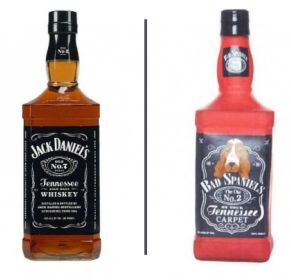- within International Law topic(s)

On Wednesday, March 22, 2023, the U.S. Supreme Court heard oral argument in the Jack Daniel's case involving whether a commercial product that parodies another commercial product receives First Amendment protection from trademark infringement claims. At issue is whether a dog chew toy called "Bad Spaniels," which looks like a Jack Daniel's whiskey bottle but replaces the text with canine puns, is a "parody" that is protected from trademark infringement and dilution claims under federal law.
A key question at oral argument was whether the Court should adopt all or part of the Second Circuit's test in Rogers v. Grimaldi (precedent set in 1989 by Pryor Cashman) for assessing First Amendment expression as a defense to trademark infringement for a "film title," considered by some to be more "expressive/artistic" speech than words on a commercial product. The Rogers test considers if a parodist's use of a trademark has "artistic relevance" to the underlying work and use of the trademark is not "explicitly misleading" as to the source of the work. This "freedom of expression" defense usually leads a court to find that there is no risk of consumer confusion.
Unlike the title of a film at issue in Rogers, at issue here is a "commercial" product (a dog toy) that also expresses a "parodist" message about the dog, the toy, and the brand by using humor or unsavory references in the parody of the brand. In particular, VIP Products LLC had replaced the brand's label "Jack Daniel's Old No. 7 brand Tennessee Whiskey" with "Bad Spaniels – The Old No. 2 on Your Tennessee carpet," and used similar-looking trade dress of the bottle shape and label design and colors.
Was the dog toy so negative that the brand could not have authorized it – or in legal terms, that "no reasonable jury would believe" the dog toy was approved or sponsored by the brand so that there was no likelihood of confusion to find trademark infringement? Beyond that, for "trademark dilution," was the dog toy so negative or unsavory that it crossed over to "tarnish" the brand? These are extremely important questions, because if a judge can make that "decision" by reading the complaint and looking at the products, the case could be dismissed at the outset. Counsel for Jack Daniel's argued that a trial judge is not always the "ordinarily prudent consumer" or the best "judge" of what consumers will think, and that the Ninth Circuit was too narrow in rejecting all the claims based on being "humorous" despite survey evidence that Jack Daniel's claimed showed actual confusion.
The Supreme Court's questioning and clever hypotheticals indicate that the Court is grappling with a proper "standard" for both infringement and dilution on the facts of this case – a product that was certainly both commercial and expressive but not purely expressive of a point of view. We anticipate that the Court will address standards for assessing "bona fide" parodies.
Until the Court rules, brand owners should take care in setting forth allegations against a junior user that are likely to invoke parody and Rogers defenses on a motion to dismiss. Judges have granted such motions, holding that "no reasonable jury" could find the accused product, expressive title, or artwork to be infringing or diluting. This possibility underscores important considerations at the outset for both sides of the table: at the time of creation, the junior user should consider presenting expressive content in a manner that does not create consumer confusion, and brand owners need to draft complaints specifically taking into account the anticipated Rogers defense to avoid early dismissal.
Image: Taken from Feb. 16, 2023 Brief of respondent VIP Products LLC.
Resources
[SCOTUSblog] Jack Daniel's Properties, Inc. v. VIP Products LLC
The content of this article is intended to provide a general guide to the subject matter. Specialist advice should be sought about your specific circumstances.



